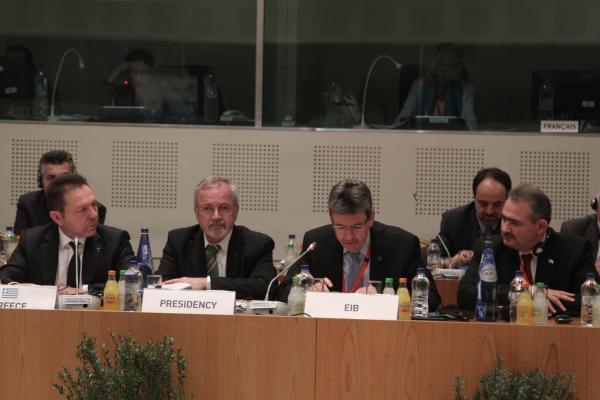
On Tuesday 1st April 2014, the Finance Ministers of the European Union and the Mediterranean partner countries gathered for the 13th ECOFIN/FEMIP* Ministerial Meeting in Athens. The meeting was hosted by the Hellenic Republic of Greece as holder of the Presidency of the European Union and co-chaired by its Minister of Finance, Yannis Stournaras, and Werner Hoyer, President of the European Investment Bank, in presence of EIB Vice-President Philippe de Fontaine Vive.
The current period marks a turning point for the FEMIP. The EIB’s new External Lending Mandate for 2014-2020 is coming at a time where newly appointed governments across the Mediterranean region face a difficult political and economic environment with urgent demands for economic stability and equitable growth. Against this background and three years after the Arab Spring, the Ministers discussed some of the main challenges and opportunities for sustainable growth and investment in the Mediterranean region.
Moreover, the EIB presented its new 2014-2020 roadmap, which outlines a more structured and proactive approach to sourcing and supporting operations in order to ensure that the new FEMIP is optimally equipped to meet the changing needs and priorities of the Mediterranean countries on the route to transformation.
Following the meeting, EIB Vice-President Philippe de Fontaine Vive in charge of FEMIP, said:
“This year’s event was once again a moment of fruitful dialogue, without which the efficient channelling of funds according to our partner countries’ economic and social priorities would not be possible. I am pleased that the Ministers endorsed our new strategy for the Mediterranean. This will allow us to extend our activities in favour of job creation, innovation and the environment for a more prosperous future for the younger generation. With the Ministers’ support, we will continue to be the region’s leading large-scale financier for long-term development looking forward to 2020.”
During the meeting, the Ministers highlighted several of their priorities, confirming their support of the EIB’s new strategy and encouraging the Bank to further develop its activities in specific areas. Key areas include:
- Maintained support for private sector development through:
- credit lines to MSMEs
- equity investments and lending to the microfinance sector
- advisory services
- Individual country strategies adapted to the needs of each partner country.
- Facilitating Foreign Direct Investment of EU companies, potentially through awareness campaigns and new products.
The Bank has committed to addressing these issues on a priority basis, working closely with local authorities, external partners and the European Commission.
New EIB Strategy for the Mediterranean: Roadmap 2020
The 2014-2020 External Lending Mandate for the EIB foresees that the Bank will maintain the same level of lending in the region, totalling approximately EUR 9.6 billion. Going forward, the EIB will use integrated sector-focused initiatives to streamline its approach to infrastructure projects, which will continue to be at the heart of EIB financing in the region. In the private sector, the Bank will seek to broaden the range of instruments available, in order to achieve greater developmental impact over the entire value-chain of Micro, Small and Medium Enterprises. Priority attention will be given to horizontal issues including employment and climate action, notably via the use of advisory services. Regional integration, including infrastructure, support for foreign direct investment and trade finance, will be reinforced. In addition, the Bank will contribute further to the development of blending mechanisms and will continue to explore synergies with other international financial institutions, including the Islamic Development Bank, with which an operational agreement was signed in 2012. Resources will stem from new donations from EU Member States to the FEMIP Trust Fund but also from engaging with non-EU financiers, notably from the Gulf region.
EIB Activity in the Mediterranean
Supporting economic and social development while improving the citizens' living conditions has been the EIB's objective in the Mediterranean partner countries since 2002. The EIB aims to establish a tangible presence in the partner countries, focusing on the economic and social priorities of the beneficiary countries to which it not only contributes its financing capacity but also adds value in project implementation and modernisation of public policies through its technical and financial expertise and advisory services. Since the democratic uprising of 2011, the EIB has provided more than EUR 3 billion of support to the real economy in the Mediterranean partner countries, focusing on key sectors such as energy, SMEs, industry, infrastructure and social housing.
* The Facility for Euro-Mediterranean Investment and Partnership (FEMIP) brings together the whole range of services provided by the EIB in the Mediterranean partner countries: Algeria, Egypt, Gaza-West Bank, Israel, Jordan, Lebanon, Morocco and Tunisia.
Documentation:
FEMIP Challenges and levers for sustainable growth

Photographer: EIB ©To be defined
Download original

Photographer: EIB ©To be defined
Download original

Photographer: EIB ©To be defined
Download original

Photographer: EIB ©To be defined
Download original

Photographer: EIB ©To be defined
Download original

Photographer: EIB ©To be defined
Download original

Photographer: EIB ©To be defined
Download original

Photographer: EIB ©To be defined
Download original

Photographer: EIB ©To be defined
Download original

Photographer: EIB ©To be defined
Download original

Photographer: EIB ©To be defined
Download original

Photographer: EIB ©To be defined
Download original

Photographer: EIB ©To be defined
Download original

Photographer: EIB ©To be defined
Download original

Photographer: EIB ©To be defined
Download original